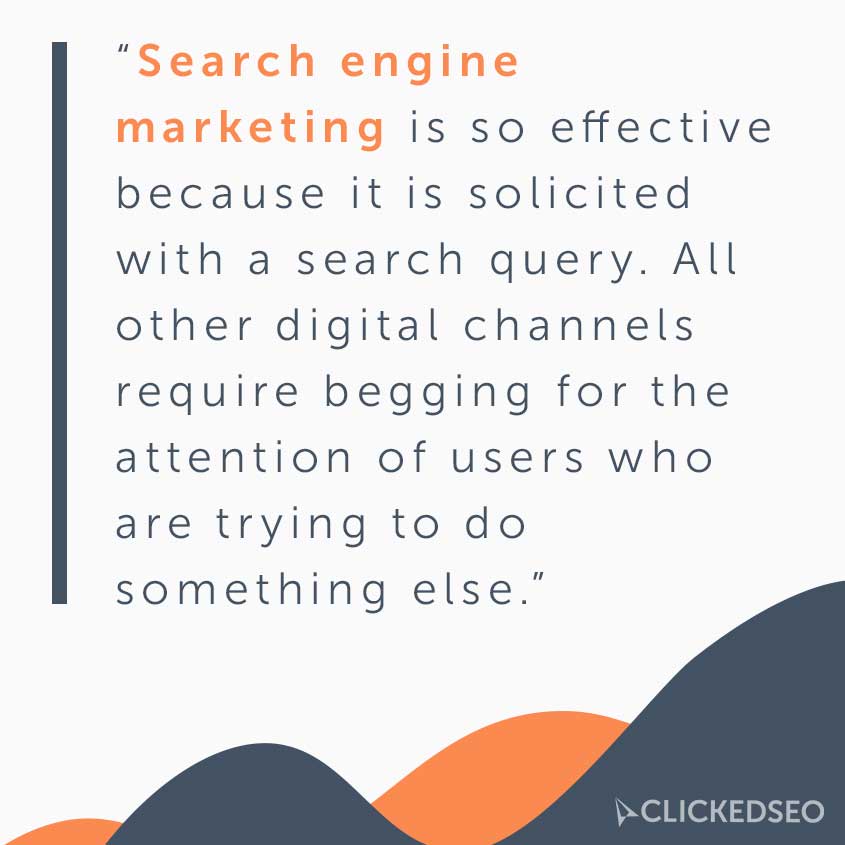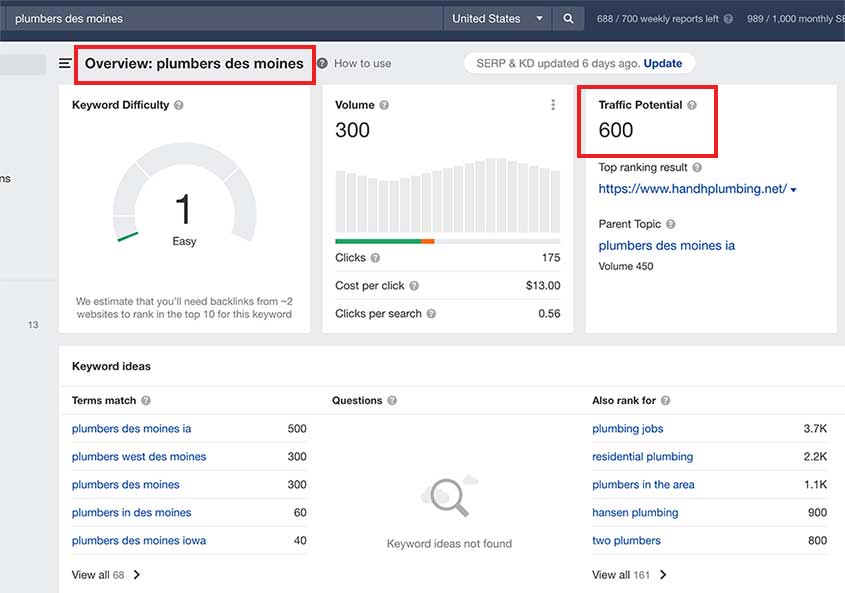Is SEO Worth It in 2024? Check These 2 Things to Find Out
SEO – is it worth it?
This is a question many business owners & managers ask themselves. And rightfully so. It’s pretty popular. But also, pretty expensive.
According to the latest data found by Clutch, SEO companies can charge as much as $150/hour and projects tend to cost between $10,000 and $50,000. I don’t care who you are, those are pretty significant numbers.
What’s more, it takes a long time to start working and its hard to know what companies can actually deliver results and what companies are phonies.
I am Ryan, founder of Clicked SEO in Des Moines, IA. You may think this article will be biased. However, I have done my best to give it to your straight. And in fact, it doesn’t always make sense to focus on SEO.
Here’s when you should and shouldn’t direct efforts toward search engine optimization.
When SEO is worth it
SEO is worth it as long as:
- There is enough search volume centered around your products or services
- It is implemented effectively
Here’s why:
- Fact: Search engines have a ranking algorithm, and an effective SEO company can implement tasks in accordance with this algorithm to enhance rankings
- Fact: 93% of online experiences begin with a search engine
- Fact: The top 5 organic positions in search engines account for 67.6% of all clicks, while less than 1% of searchers click on a second page result
- Fact: Search engines have the highest conversion rates, over 3x higher than any other digital marketing channel.
Let’s talk about that last bullet, because it’s a big win for SEO and Search Engine Marketing (SEM) as a whole. It is saying that a search engine impression is 3x more likely to convert into a desired action (i.e. inbound lead or online transaction) than social media marketing or any other digital channel.
Why is that? The answer is simple – intent. If you gain the attention of someone who is searching for your service, they’re more likely to buy from you.
In other words, with search engine marketing, your impressions are solicited – the internet user is trying to buy from you by searching online. This is in contrast to other channels such as social PPC, banner ads and email blasts which beg for the attention of people who are trying to do something else.

Ask yourself:
- Who’s attention would I rather capture? Someone searching on the internet “[my service] companies near me”, or someone trying to check the like count of their latest beach selfie?
- If I could put my inbound sales process on autopilot by getting connected with people who already want to buy from me, would I?
Sound appealing? Keep reading.
1. SEO is worth it if: There is enough search volume centered around your service
First, you need to ensure that people are searching for your products or services online. Lucky for us, we can do this for free and easily.
While paid tools will give the best data, here are some free keyword research tools:
- Keyword Generator for finding popular keyword ideas.
- Answer The Public for finding keywords phrased as questions.
- ChatGPT for finding seed keyword ideas.
- Ahrefs Webmaster Tools for finding low-hanging keyword opportunities.
- Google Keyword Planner for finding related keywords.
- Google Search Console for finding declining keywords.
- Google Trends for finding breakout keywords.
- SERP Checker for analyzing a keyword’s traffic potential.
- Keyword Difficulty Checker for checking a keyword’s ranking difficulty.
To use these tools, you generally start by adding 1 or multiple keywords into the search bar. From there, you can see the monthly search volumes as well as new keyword ideas. Pretty nifty, right?
Now that you have an idea of your target keywords and their monthly search volume, how do you determine if it is “enough” volume for SEO to be worth it? The answer is, it will depend based on a number of things including your profit per sale, click-through rates, and conversion rates.
One tool you can use to assess the benefit of SEO is Ahref’s Traffic Potential feature, which estimates how many monthly organic visitors that you could generate from a #1 ranking of any specified keyword.

The above example shows an estimated monthly search volume (Traffic Potential, or TP) in the US for “Plumbers Des Moines” of 300. A #1 ranking spot would generate an estimated 600 monthly users (The TP is higher than search volume because of keyword variants of “Plumbers Des Moines” such as “Des Moines, IA Plumbers”, “Plumbers Near Me”, etc. Since these keywords are different ways of asking the same question, you will likely rank for all of them if you rank for 1).
Now that we know the monthly traffic potential from a #1 organic position, we need to estimate sales resulting from it in order to assess ROI.
Here’s how: Say you expect 10% of these 600 visitors to convert into a business inquiry (60 leads / month). And of those 60 leads, 30% will convert into a sale (18). So we estimate 18 sales per month from a #1 ranking position for the search term “Plumbers Des Moines”. Say that on average you net $200 from every plumbing job. $200 profit x 18 monthly SEO sales = $3,600. So in this scenario, you can estimate that if an SEO company could get you to #1, your monthly ROI on SEO would be $3,600 less the monthly cost of the SEO services.
Another useful tool to help you project your ROI from a high ranking position is SEO Arcade’s Revenue Estimation feature. This tool does all of the math for you with just a couple clicks.
Both Ahrefs and SEO Arcade cost money and require a bit of know-how. If you’re looking to hire someone for your SEO, I suggest running basic keyword research on Google Ads to determine search volume, then asking your prospective SEO companies to run the projected ROI numbers, using the above info to keep them in check!
2. SEO is worth it if: It is implemented effectively
This one is definitely a no brainer, but if you or the company that you hire implement ineffective SEO practices (or none at all), then you will not rank and you will not benefit from “SEO”.
SEO is a highly specialized skill, and I hate to admit it, but there are a lot of companies out there who just don’t quite know what they are doing (or they do know what they’re doing, but you’re just a cog in their wheel and they don’t spend enough time on you).
“Do a good job at SEO” is basically what i’m saying. Easier said than done, right?
If you stumbled across this article, odds are you are considering 1 of 2 scenarios: 1. Hiring an SEO agency, and 2. Tackling your SEO in-house. Here is my advice for SEO success in both scenarios.
Hiring an effective SEO agency
To hire a good SEO company, do this 1 thing: Look at the SEO growth of their existing clients. You can do this by simply asking them. Look for things like organic traffic, rankings, and sales growth.
What if they say “We respect the privacy of our clients, and don’t share that kind of information.” I call BS, and so should you.
Shameless plug – Clicked SEO has a proven track record of ranking websites and increasing sales for our clients. Hit me up and I’ll show you exactly what i’m talking about.
Implementing effective SEO in-house
If you’re hiring someone to do your SEO, do the same thing that you did for the agency – ask them to show case studies and organic growth from previous projects.
If you’re learning it yourself or hiring an entry-level person to dabble with SEO, here’s my advice: Take advantage of the massive wealth of free SEO resources and act as a sponge (I’m self-taught, and you could be too). HubSpot’s SEO tutorial is a good place to get started with the basics. Some other big ones are Ahrefs, Moz, Gotch SEO, Neil Patel, and Search Engine Journal.
My second piece of advice: Be patient. SEO takes time. Don’t get discouraged if you don’t see immediate results. It can take anywhere between 6 months to a year to start benefiting from SEO.
Be sure to appropriately prioritize your time, but starting with the low-hanging fruit tasks, then going onto bigger projects.
When SEO is not worth it
Remember, SEO is worth it if there’s enough search volume and its done properly.
If either of these 2 things aren’t true, then SEO may not be worth it.
Some industries sell super niche stuff, or are bringing out a brand new product/service. In these cases, there probably won’t be much search volume based on their services and other digital marketing channels such as social PPC or email marketing may make more sense.
Second, crappy SEO will not bring results (duh).
The bottom line
SEO is absolutely worth it in most cases as long as its done right!
Its major benefit over other digital marketing channels is that it is solicited – It connects you with people who are actually trying to buy from you by searching online.
If you’re interested in exploring SEO, do some simple keyword research and start looking for reputable companies to provide you quotes (or hit the computer and start researching how to do SEO yourself).
At Clicked SEO, we implement no nonsense SEO that works. Click here to contact me directly, or click here to learn more about our services.




